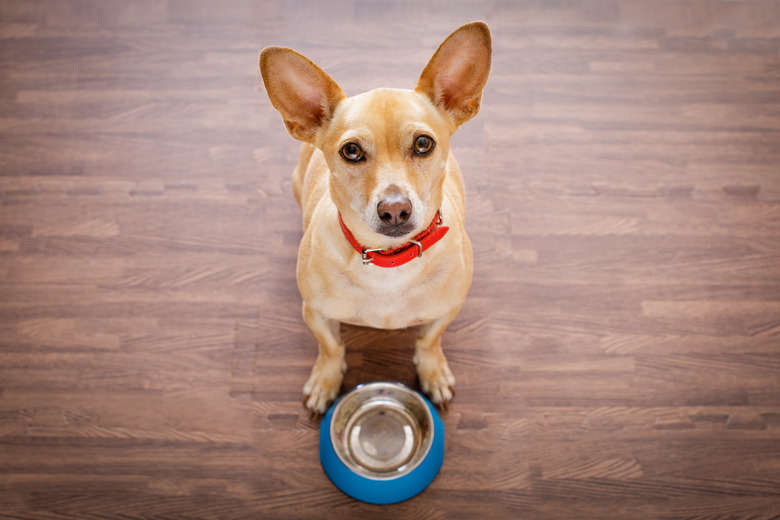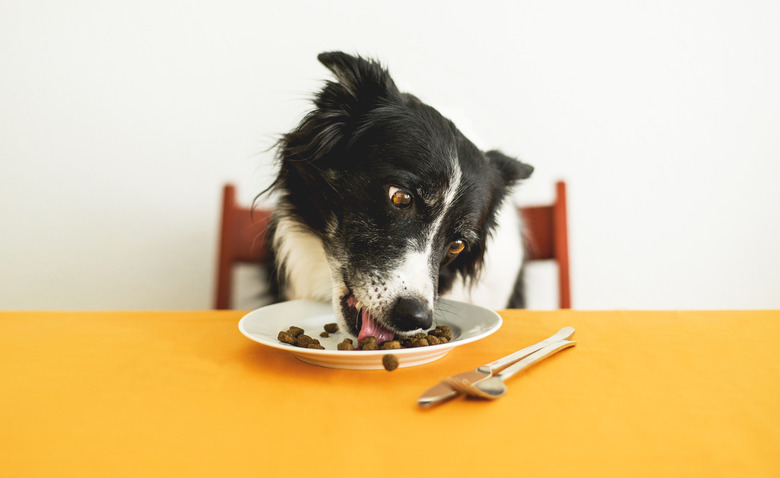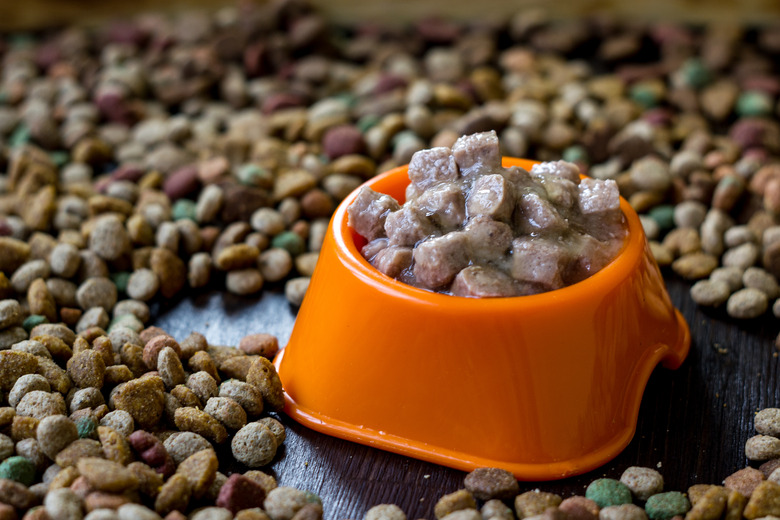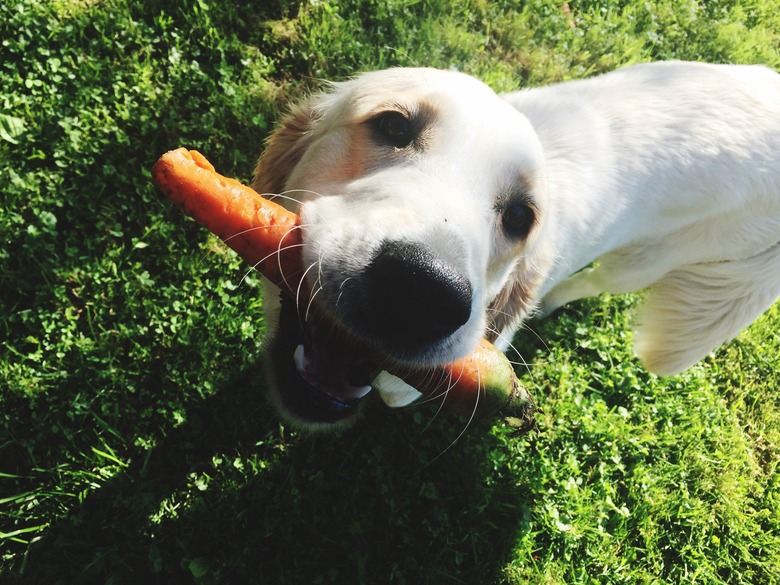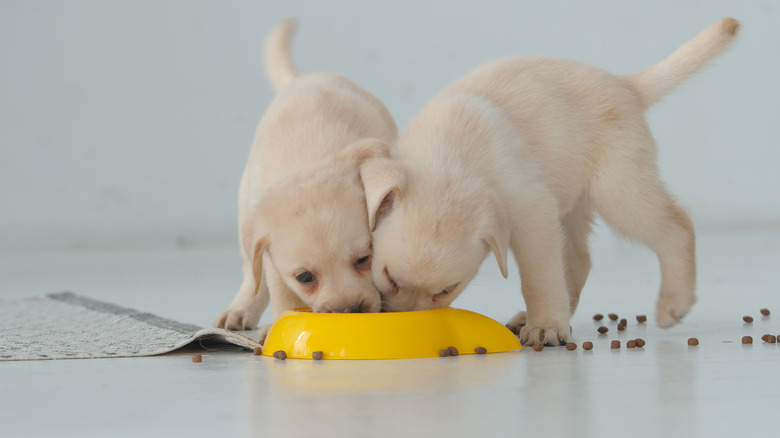What Do Dogs Like To Eat?
When our puppy had reached about a year old, we were gradually moving her from her puppy food to adult dog food. We didn't know what food was best, so we bought a few options to see what she liked best. Some of the food, she gobbled down with excitement. The other food, however, she gave us a judgmental stare that almost dared us to try eating that nonsense.
There are so many different types of dog food on the market, it's tough to choose what's best for your dog. It's also tough to know what food your pup will actually like. So we dug into the science behind the doggie diet to really understand what foods will make your dog happy and healthy.
What foods do dogs like to eat?
What foods do dogs like to eat?
Unlike cats, who are strict carnivores, dogs require more of an omnivorous diet. That means that, along with meat, dogs need grains, fruits, and veggies to ensure they get all the nutrients they need. Some people try to suggest that anything but meat in a dog's diet is filler, but that really isn't the case. Unless your dog has a specific allergy, foods with whole grains and produce mixed in help pups get the vitamins, minerals, and fiber to keep them in optimal health.
However, as with many human foods, the quality of dog foods varies between breeds. When buying dog food, it's important to read the label to ensure that what you're getting is as high-quality as possible. And there are a few dog food label rules that you should be aware of.
- The name matters. Dog food isn't just named at random after a specific meat, but often based on how much meat was actually used. If you look for dog food labeled as just the name of the meat, like "chicken" or "beef," then regulations require the food be at least 70% made up of that meat. "Chicken dinner" or "with chicken," however, signal a lower percentage of real meat, 10% and 3% respectively.
- Look for the words "complete and balanced." This term isn't just for show, it's actually a phrase regulated by the AAFCO (Association of American Feed Control Officials) that states that a food meets minimum requirements for all the nutrients a dog needs.
- Like human food, the ingredients are listed in order of greatest amount to least. You want to see some of the most important ingredients, like meat, at the top of the list, because that suggests that the food has a high percentage of quality ingredients.
Dogs tend to prefer wet food over dry food.
Dogs tend to prefer wet food over dry food.
Most dog owners know that there are two main kinds of dog food – wet food and dry food. Dry dog food is probably the most convenient, and least expensive, but wet food tends to be more palatable to our pups. Wet food usually has a stronger smell, which can help make the food seem more appetizing, and its soft texture makes it easier to eat. Wet food also provides much-needed moisture in your dog's diet. However, canned wet food tends to be more expensive than dry food, but a frequent solution is to mix a little wet food into your dog's dry food for the best of both worlds.
Are there foods that dogs should never eat?
Are there foods that dogs should never eat?
When it comes to food that falls on the ground, dogs tend to not be very picky. Most will try to eat anything you drop on the floor, and there are a few foods you should be extra careful with.
- Grapes and raisins. Too many can cause kidney failure.
- Chocolate. Contains chemicals called methylxanthines that can cause seizures, heart problems, and death. Dark chocolate is the worst, because it contains more of the chemical, while milk chocolate isn't as bad.
- Garlic and onions. These can cause anemia if eaten in large quantities or in small quantities consistently.
- Apple cores. Apples can be good for your dog, but the seeds and cores contain arsenic, a potent poison.
- Cherry pits. The pits of cherries contain cyanide, another poison.
- Cinnamon. This spice can cause major irritation and even stomach issues and vomiting.
- Macadamia nuts. These nuts can majorly harm your dog's nervous system and cause death.
- Xylitol. This is a common additive in anything that is "sugar free." It can cause seizures and coma, so keep your pup away.
What human foods are safe for dogs to eat?
What human foods are safe for dogs to eat?
Don't worry, while there are some foods you should make sure you don't feed your pup, plenty of human foods are perfectly healthy to feed your dog as a special treat. Notice we said special treat, because the majority of your dog's diet should be dog food that has the proper balance of nutrients. However, on occasion, you can indulge your pup in a few things that humans eat.
- Meats and proteins. Obviously, one of their faves. Lean cuts of meat like chicken and salmon prepared without salt are a-OK for pups. Also, cooked eggs make a yummy occasional treat as well.
- Peanut butter. Most dogs LOVE a little P.B. Just keep portions small, because of the high fat and salt content.
- Baby carrots. They're like crunchy little orange sticks!
- Plain yogurt and/or plain cooked pumpkin. Both are good for your pup's digestive system.
- Popcorn. It makes an excellent light treat for training if you make it air-popped and unsalted.
If you follow some of these guidelines, chances are, you'll have a healthy and satisfied pup.
Because we're all a little happier when we have something tasty to eat!
Always check with your veterinarian before changing your pet's diet, medication, or physical activity routines. This information is not a substitute for a vet's opinion.
